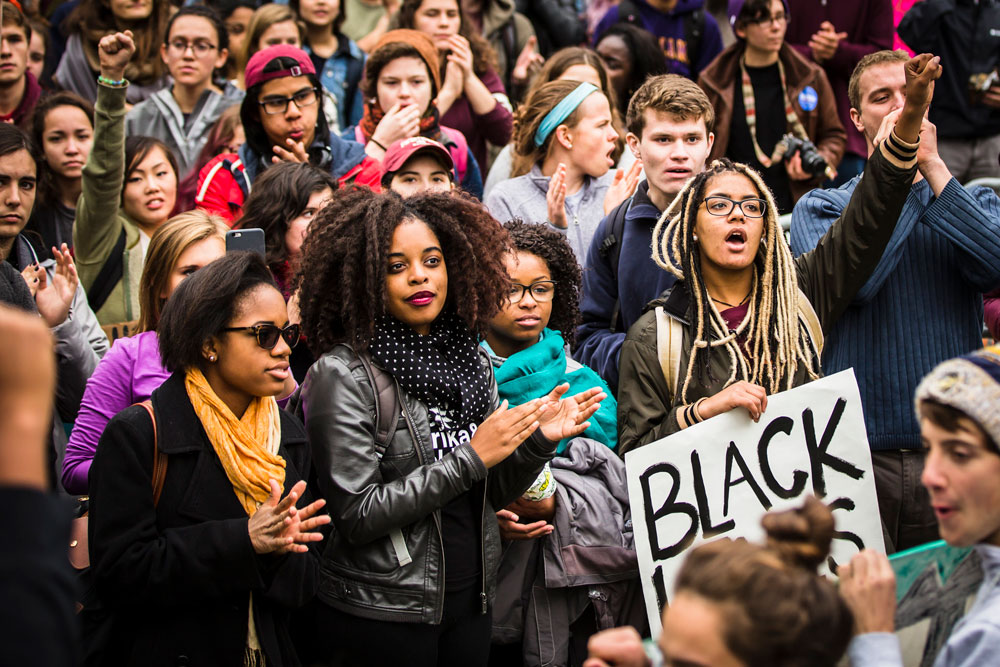
A few years ago, I attended a New York City-area conference that presented some stunning information about who makes up the staffing and leadership in nonprofit organizations. It’s estimated that 80 percent of the nonprofit workforce in NYC is made up of people of color, and 80 percent of those workers are women of color. Yet, only 16 percent of nonprofit CEOs in New York are people of color. I couldn’t find the stat on what percentage of those were women, or Black women for that matter, but I’ve never been able to get that data out of my head. We’ve got work to do.
A couple of days ago, I wrote a LinkedIn post about the need for the nonprofit sector to do a better job uplifting and supporting Black women. The next day, I woke up and nearly 5,000 people had viewed the post, and over 300 had “liked” or commented on the post. Because of the response, I wanted to give people working and volunteering in the nonprofit sector some real tips and tools for changing the trajectory of our sector and moving the needle on equity as it relates to the experiences of Black women in particular.
My career in the nonprofit sector began over 20 years ago when I realized that I could use my passion for social justice, and skills and expertise, in direct service to communities that I love. But my love affair with the sector dates back to those first experiences as a young person on Manhattan’s Upper West Side as a participant in my local settlement house’s day camps, after-school programs, and via a myriad of leadership opportunities. Whether as a student in the LEAD Program in Business or as Chief Justice in the YMCA of Greater New York’s Youth and Government Program, the nonprofit sector gave me my first opportunities to showcase my leadership ability.
As a young Black girl, my leadership capabilities were celebrated and encouraged by amazing youth workers. As a professional Black woman, my story has been as influenced by great allies, mentors, and champions as it has been with adversaries, bullies, abusers, and just plain old haters. Everything I know about leadership, I learned via my family, my community, and the nonprofit sector. And, everything that has ever made me question whether or not I wanted to continue on this path has also grown out of some troubling experiences I’ve had in this sector—from micro- to macroaggressions—and most of those assaults on my dignity have gone largely unchecked.
Sign up for our free newsletters
Subscribe to NPQ's newsletters to have our top stories delivered directly to your inbox.
By signing up, you agree to our privacy policy and terms of use, and to receive messages from NPQ and our partners.
Despite the ups and downs, I want to make it clear that this commentary comes from a place of love and hope and possibility, and my expectation is that you will read and share this article, and join me in a movement to make the nonprofit sector be all that it can be. I like to think of this amazing sector as America’s Democracy Workshop—this is the sector where we hold the larger society’s feet to the fire on major social and economic issues, and where we create pathways and opportunities that change lives.
I want to emphasize that we don’t need more statistics, research, or testimonials when it comes to the sector’s failure to uplift Black women in executive leadership roles; we need demonstrable, decisive action in support of Black women’s leadership in this sector. There is no shortage of talent, training, etc. when it comes to Black women—we are poised and very often over-prepared to lead. What we do need is a decisive step away from the behaviors and practices that cause racial trauma at work, and a deep commitment to accountability and consequences. Make no mistake, if you are ignoring the leadership of Black women in the nonprofit sector, or actively working to undermine that leadership, you are causing personal, psychological, economic, and social harm to Black women. And, if you are silently standing by as a disinterested witness to harm aimed at Black women in the nonprofit sector, you are complicit and also responsible for our trauma.
I also want to acknowledge that the points I raise here could easily apply to many communities. But I’ve only ever been a Black woman, so I often speak from that point of view. That said, I think the values that undergird my pointers can benefit the sector as a whole and make it more equitable for all communities. And, I think it goes without saying, but I’ll say it anyway—not all nonprofits…
- The board of directors must engage in equity and inclusion work. It’s very difficult to move a nonprofit organization forward without the leadership and guidance of an engaged board of directors. Moving the needle on equity and inclusion means that the board itself must create opportunities to a) learn about the structural and institutional barriers to equity within the sector and within their organizations; b) confront their own personal and professional racial biases; and, c) develop systems of accountability for addressing inequities within the organization that include real consequences. I’m saddened by the number of nonprofit CEOs who are either too afraid to invite their board to have these conversations, or who receive pushback from their boards about whether or not these conversations are vital to their work. If you are a board member, Black women need you to step forth boldly and wholeheartedly to insist that your board colleagues do the work of undoing racism across all levels of the organization. That means vetting board members before they join, engaging in meaningful training and conversations about what bias has to do with your work, and holding board members accountable for questionable statements and behaviors that cause harm.
- Eliminate “give/gets” on boards. It’s been my experience that boards with give/gets tend to use those minimum contributions as barriers to board diversity. One can always point back to the minimum contribution as the excuse for why there are no people of color on a board of directors. Although boards, not staff, bear primary responsibility for ensuring that an organization has the resources it needs to operate, a board with little diversity often comprises the people furthest removed from the problems the organization seeks to address. A former colleague whose work centers Black and brown youth once bragged that their board no longer considers anyone who can’t make at least a six-figure gift for board service. Wealth is one factor of consideration when building a board, but it should not be the single most important factor. Do you have multiple board members who reflect the faces of the people you are serving? Remember, tokens went out with the ’70s—we want to see representative diversity, not a single person to let you off the hook! Do you have content experts who can work in real partnership with the staff to help create solutions to the problems the organization is trying to solve? Nonprofit organizations need all kinds of perspectives, expertise, and skills to function effectively. A collegial board is desirable—but, beware of tactics that can turn your board into an extension of the problem, rather than an innovative solution. You’re not building an exclusive club or clique. Your nonprofit has a social contract with the broader society to do real work in service to the organization’s mission. Honor the social contract!
- Check your search firm. A great search firm has its ear to the ground about where to find good, diverse talent; a deep understanding about the organizations it works with; and a penchant for understanding the needs and culture of the board of directors. But search firms also serve as gatekeepers, meaning they often determine who the board gets to meet with for executive positions. We should be taking a fresh look at who works at nonprofit search firms. What work are they doing internally to address equity and inclusion, and how is their internal process informing their approach to executive searches? Over the last 36 months, how many Black women has the firm placed? I once had a white administrative assistant at a search firm ask me, “Do you really have a doctorate from Columbia?” Insert red flag here! And, if you’re on a board and you are not sure about the search firm your board has selected, join the search committee so you can ask questions and push back if needed. If there are no Black women in the final candidate pool, this could be a reflection of biased gatekeeping at the search firm level.
- Stop posting jobs that aren’t really available. I know this sounds crazy to the average person, but I can’t tell you how many jobs we see posted on LinkedIn despite the fact that a decision has already been made. Many years ago, I was a final candidate for a job that I thought was the perfect fit. I did the writing assignments, made an amazing presentation, and, in the end…I didn’t get the gig. That failure made me question everything, from my clothes to my mannerisms, to whether or not I was too focused on “business” and didn’t come across as warm and personable. Years later, a colleague casually mentioned why I hadn’t been selected: the person who received the offer had a high-level city official reach out to the board on their behalf. They knew they weren’t going to hire me the whole time I was preparing for that final presentation. What a waste of my time! I’m no lawyer, so I don’t know how one goes about hiring for an executive position without a transparent search process. But, I can tell you that it is incredibly disappointing to see the Black women in my network go up for jobs that don’t exist and leave those processes feeling demoralized and uncertain about their leadership capability. I understand completely that the world of work often revolves around networks. I’ve certainly used my existing networks to let people in the community know when I have positions available. But, if there are no Black women (or people of color for that matter) in your network, you should be working to change that. If we only hire people we already know, we are creating institutional barriers for the people we don’t know.
- “Black woman expert” is not an oxymoron. Because of the work I do and the circle I’ve chosen, I get to interact with amazing Black women from a host of sectors all the time. The Black women I encounter in this sector often have multiple degrees and lots of credentials certifying that they have the content expertise and capacity to lead. And still, most of us have found ourselves either fighting to do the work that we were actually hired to do, or spending time defending everything about how we go about doing our jobs. I once worked at an organization where everything I said or did had to be vetted by a white person within the organization—even if the white person in question was not a senior member of the team. Encouraging collaboration is one thing, but insisting that someone white validate the ideas and methods of Black women feels abusive. Over time, I’ve gotten used to having to find research to back up my decisions about programs, fundraising, branding, personnel, etc. But, how ridiculous is that? My white colleagues get to explore, innovate, imagine, and, God forbid, make mistakes without those mistakes confirming people’s initial lack of trust in their ability to lead. Most Black women leave nonprofit organizations because they feel undervalued, under-recognized, and limited in their ability to actually do their work without the pesky second-guessing of the powers that be. If your organization has seen a revolving door of Black women, interrogate your culture, seek feedback, and then build systems of accountability for retaining and promoting Black women in your organization. Hint: Something is wrong. It’s probably you.
- Don’t undermine Black women’s leadership. Seems obvious, huh? Well, if you’re a nonprofit board member or executive, and you’ve allowed a Black woman’s subordinates or colleagues to leapfrog over her when they a) don’t like a decision she has made, or b) don’t want to accept direction from her, then you are a big part of the problem. You should not entertain, encourage, or elicit back-channel feedback about a Black woman leader from people she is responsible for managing. That means, the moment they reach out to you, you cut them off and invite them to follow proper protocol. Don’t entertain. Don’t listen. And, don’t ask Black women to defend themselves based on back-channel feedback—that’s a racialized macro-aggression if I’ve ever seen one. I once had a white subordinate complain to multiple board members that I must not have experience supervising white people because I asked her to do something that was completely within her job description—and one of those board members felt completely comfortable actually asking me if that were the case. Talk about #AmyCooperNonprofit! If you were outraged by the video of a white woman calling the police on a Harvard-educated Black man in Central Park after he made a reasonable request in accordance with the law, you should know that you are causing comparable harm to Black women in the workplace when you create workarounds for those who don’t want to honor their leadership. If the board and executives don’t honor Black women’s leadership, you certainly can’t expect others in the organization to do so.
- Pay Black women. A Black woman CEO recently said that her white, male board chair challenged her board of directors to build a compensation package and contract that was comparable to what they would do for any white man. This is huge! Gold star for that board chair! I’ll admit, I’ve struggled mightily to negotiate on my own behalf over the years. This is in part due to that little voice inside my head that is prone to engage in imposter syndrome. But sometimes folks just don’t think Black women “need all that money,” as per a bank teller when I tried to deposit a consulting check. I digress. Early in my executive career, when I first challenged my pay, someone in a position of power retorted, “But, isn’t that already a lot of money for you?” Yes, folks, these are real stories from the nonprofit frontlines. My less-experienced self had no idea about the scope of perks and incentives that were offered to white colleagues. And, lots of Black women I know were raised not to talk about money, so as we advance in our careers, we lose out on the advice and experience of others. I’ve seen white leaders leave struggling organizations in absolute shambles and still walk away with their student loans paid off, co-op apartments, lifetime healthcare, and lucrative severance packages (read “cold, hard cash” here). And, while I do question the ethics of some of those arrangements, at the end of the day I want boards and CEOs to stop pushing back against fair compensation for skilled Black women executives. Just write the check. Treat us like you would any competent white man!
- Black women need sponsors. I’ve had many wonderful mentors over the course of my career, but at this stage of the game I need sponsors: People who are going to speak on my behalf when decisions are being made and to ensure that I have access to opportunities that are commensurate with my expertise and experience. Allies are cute. But, if you have power and influence in your organization or across the sector, sponsor a Black woman. Knock down doors for someone who needs and deserves access. If you can’t do it because you’re an awesome human being, then do it because it makes good business sense. Black women are often near the bottom of every measure used to assess wellness and advancement. When we go to get these degrees, we have personal skin in the game to change outcomes. Hint: Putting up barriers for access like “must have managed a $20M+ budget” as a hiring criterion is the epitome of institutional racism. Use your imagination and engage with us! We are ready!
- Fund Black women. That’s it, folks. That’s the whole sermon. I’ve spent enough time in this sector to know that sometimes the reason you don’t get the grant has absolutely nothing to do with the font you used in your proposal, or the data blah blah, or the metrics blah blah. Of course, as a seasoned fundraiser, I understand that philanthropy should support organizations that are having an impact, and that can articulate the actual difference they are making. But, sometimes folks are getting funded because of who they know, not what they know or how well their organizations perform. It’s troubling to see people positioned for success because their godmother is on the board of a foundation, or their father’s business partner loves their ideas. Networking is good. But, neither of these scenarios is directly related to getting the work done. Philanthropy is a public trust. In exchange for tax benefits, philanthropy needs to hold itself accountable for equity and access. The challenge I’ve observed with philanthropy’s shift toward “professionalism” across the sector and its growing emphasis on “scale” and the exaltation of “data” is that no one has solved any of the problems this sector purports to be focused on as a result of data. No one has solved educational inequality. No one has solved hunger. No one has solved housing disparities. No one has solved health disparities. The list goes on. I say this to suggest that maybe, just maybe, we are using the emphasis on metrics, data, and scale as a way to defund and undermine grassroots organizations and to insulate philanthropy’s ability to continue supporting white-led organizations. If you are an individual donor with a real commitment to social justice, commit to dedicating a portion of your philanthropy to support diverse nonprofit leadership. If you are a foundation or corporate funder, commit to diversifying your board (see earlier tip) to help ensure greater knowledge of Black women-led organizations and as a move toward equity and inclusion in your giving.
- Reckon with racism. The mythic Horatio Alger narrative of pulling one’s self up by one’s bootstraps is one of the most dangerous and damaging cultural tropes to ignite the white imagination when it comes to the work ethic of Black folks. As Dr. King often said (not in these exact words, of course) it’s not fair to tell someone to pull themselves up by their bootstraps when you have used police violence, public policy, poor health care, redlining, pay disparities, under-resourced school systems, and actual fire to literally burn the boots off her or his feet. I applaud the statements and hashtags. Shout out to everyone who took a stand. But now, the real work must begin. Here are a few resources to get you started.










